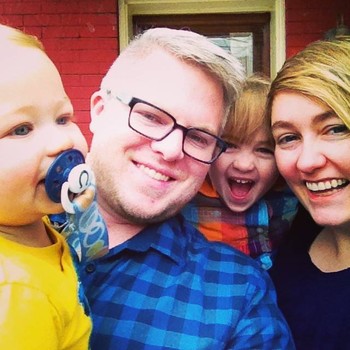Adventures of a Presbyterian pastor on a Jesuit campus
 What a Catholic taught this Presbyterian about worship
What a Catholic taught this Presbyterian about worship
Different emphases on the Word and the Eucharist open new possibilities.
by Abby King-Kaiser
I stood at the back of the room, nervously talking to Mike, our guest preacher, about the weather, the coming spring, and what I was planting in my garden. We both were clear on how worship would proceed, so we were filling time before the service began.
So, why would I be nervous?
Because this was not just any “Mike.” This was Fr. Michael Graham, president of Xavier University and Jesuit priest. I grew up in a house where all adults went by Mr. or Mrs. or a professional title. I still call some of my friends’ parents by a title and a last name. I struggle to call Fr. Graham by his first name, which is how he signs his emails.
Part of that is his pastoral nature. That night, as I thanked him for being with our students, for preaching once a semester for our quirky Protestant worship, he said, “But, no! You do the hard part.” I must have looked at him funny at that moment because he quickly added, “Communion.”
What? Communion is the hard part? No, no. I didn’t have to write a sermon. I didn’t have to struggle for words and meaning, wrestle with the text, edit and edit and edit. All I had to do was invite people to the Table on behalf of Christ. All I had to do was pray, break bread, and pray some more. I can do that. The preaching is the hard part. He contended, however, that weaving the gospel, the sermon, and the students’ experiences into the Eucharistic prayer was the hard part.
Afterwards, as we chatted together about the service, it became obvious that this question of the “hard part” is rooted in the differences in our respective traditions. Protestants prioritize the Word, Scripture. We take it very seriously. So seriously. Worship thus centers on the Word. Even the formal ways we talk about worship usually relates back to the Word. Catholic Mass, on the other hands, centers on the sacrament. The altar is the centerpiece, and much of the rest of worship, prayer, and even a faithful life, flows from the sacrament. It even changes the way we talk about encounters with God.
This doesn’t mean that Communion isn’t essential for Presbyterians (though the infrequency of its celebration in some of our congregations may raise questions to that effect) or that Catholics are unconcerned about Scripture. It’s just a question of where our emphasis lies.
Perhaps we can learn from each other.
These differences have been gifts for our worshiping community, Common Ground. It means that we approach the elements of worship with these multiple perspectives. It means that while Catholics challenge us to find God at the Table, Pentecostals challenge us to find God in prayer and Presbyterians challenge us to find God in the Word. And more importantly, we find ourselves taking on these gifts of other traditions as our own.
As a trained clergy person, I find letting go of control in worship challenging. It goes against my training—not to be sure how each and every moment will turn out. But, when working with a diverse community, my own need for control and planning has become one of our greatest enemies. The more chances people have to lead worship and not just learn but teach, the more Common Ground is owned by the community and reflects the beauty and breadth of the body of Christ.
Abby King-Kaiser is the Assistant Director for Ecumenical and Multifaith Ministry at the Dorothy Day Center for Faith and Justice at Xavier University. She returned to her hometown of Cincinnati, Ohio for this call after a long sojourn in the Bay Area. She is a coffee snob, occasional painter and obsessive, though amateur, Instagrammer (@revabbykk).